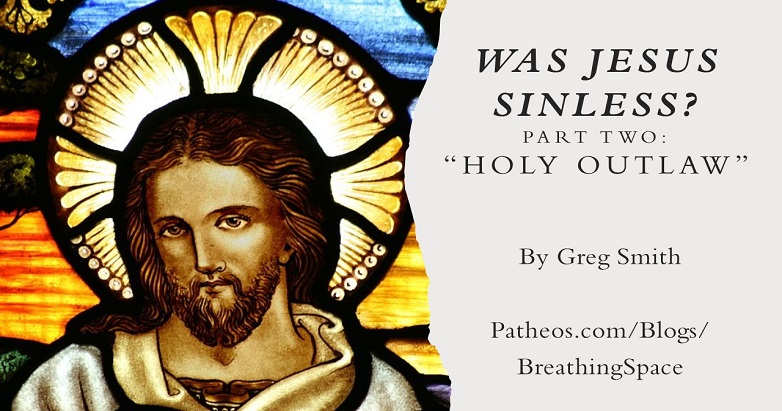Was Jesus sinless? Christian teaching claims that he was—but what does that mean? In my last article, I discussed the opposing viewpoints that sin is either a quality inherited from our sinful ancestors or an individual decision. In this article, I will ask whether Jesus was sinless if we understand sin as a decision to break divine law. In my next article, I will ask if Jesus bore the stain of original sin. And my final article in this series is…well, a surprise.

Creative Commons Attribution-Share Alike 3.0
Alterations made with permission
A Sinless High Priest?
Hebrews 4:15 claims that Jesus was a sinless high priest. In the old days, when the priest would go up to the altar to make sacrifices for the people, he first had to offer a sacrifice for his own sins. In this way, he would be clean when he entered the presence of God. But Jesus did not need to make a sacrifice for his own sins as he was already holy. This scripture says that Jesus was tempted in every way that we are tempted, yet without sin. But it’s not claiming that Jesus never sinned. It’s actually referring to the wilderness temptation.
Wilderness temptation
I grew up in a church that taught that Jesus never committed a single sin. We learned that the wilderness temptation was proof that if Jesus could withstand such great temptations, then certainly he could resist small ones. We saw the wilderness temptation as Satan’s attempt to foil the absolutely sinless Jesus. Only a sinless Messiah could be the sacrifice for our sins, we were told—so if the Devil could make him sin, he would keep Jesus from fulfilling his mission.
Since I reject the theory of penal substitutionary atonement, I also reject the need for Jesus as a perfect, spotless lamb. So, the story of Jesus’ temptation wasn’t a satanic attempt to disqualify Jesus as the Messiah. Instead, it was Jesus facing up to his own inner desires that might prevent him from becoming a servant to humanity. If Jesus hadn’t wanted these things, they wouldn’t have been real temptations. And if he hadn’t been capable of sin, then the temptations would have been futile.
A Holy Outlaw
Instead of being of unimpeachable character, Jesus was more of a holy outlaw. The gospels record several incidents where Jesus broke the law of Moses, and even demonstrated character flaws. In fact, Jesus is guilty of both sins of commission (things you do), and also sins of omission (things you should do, that you don’t.)
Sins of Commission
- Jesus violated Sabbath law by healing on the holy day of rest. He justified this by saying anyone would rescue an animal that had fallen into a pit on the Sabbath. He wasn’t wrong—but that didn’t mean that he was a flawless keeper of the law. Jesus also allowed his disciples to harvest and grind grain on the Sabbath, which was forbidden. He justified this by pointing out that David allowed his men to eat consecrated bread—so if the king was allowed to break the law, then Jesus could disregard it as well, in time of need. Again, he wasn’t wrong—there are times to break the law. But it would be incorrect to claim he wasn’t a lawbreaker. He said that the Sabbath was made for humans, not the other way around. He declared himself Lord of the Sabbath. Yet the fact remains that for all of his good reasons, Jesus did break the Sabbath law. And by doing so, he encouraged Christians to break the Sabbath as well.
- Jesus dishonored his father and mother. When he was a boy, he disobeyed them by leaving the caravan and spending the day in the temple, making them worry about him and forcing them to go back and find him. As an adult, he also dishonored his mother by disregarding her and his siblings when they came to visit.
- It looks like Jesus even lied. Jesus said he would not go to Jerusalem for the Passover, but as soon as his brothers left, he went in secret. Every time I’ve heard preachers mention this, they claimed he did not lie but simply changed his mind. This seems reasonable, except that the Jesus of the Gospels knew the future and was deliberate in everything he did. In any case, even if he did change his mind, for him to do something he said he would not do was breaking his word.
- Jesus cursed the fig tree that did nothing but lack fruit when it wasn’t even the season for fruiting. When he passed by again, the disciples saw that it had shriveled and died.
- Jesus cussed the Pharisees. You can’t tell me that the things he called the Pharisees weren’t considered cuss words in his day. (Click here for my article on cussing like Jesus.)
- Jesus insulted his disciples by calling them fools. He even called Peter the worst name of all—he called him Satan!
- Jesus insulted a Canaanite woman by calling her a dog.
- Jesus made a whip out of chords and drove the money changers and merchants out of the temple. Some claim that Jesus never struck anyone, not even an animal, with this whip. They say he only made loud noises and swung it around to scare people out of the temple. But if he’d done this downtown in your city, he would be charged with brandishing, intimidation, assault with a weapon, and property damage. These will get you arrested anywhere.
Sins of Omission
- What about all the people Jesus didn’t heal?
- What about the sermons that some people didn’t understand, yet Jesus did not take the time to explain them?
- Sure, Jesus said the 5000, but what about all the other people Jesus didn’t feed?
- What about the people who got drunk on the line that Jesus made? Of course, some people believe he may just make grape juice, but that’s just bad scholarship.
Original Sin?
The gospel writers make no bones about all the times that Jesus either committed sins or omitted things he might have done to help more people. If our definition of a sinless messiah is one who never did anything wrong, then Jesus does not fit the bill. So, is it possible that when we call Jesus “sinless” we mean something else entirely? Maybe the Catholics are right when they claim it’s all about original sin, and not individual misdeeds. Or maybe they aren’t. Read my next article to find out.












